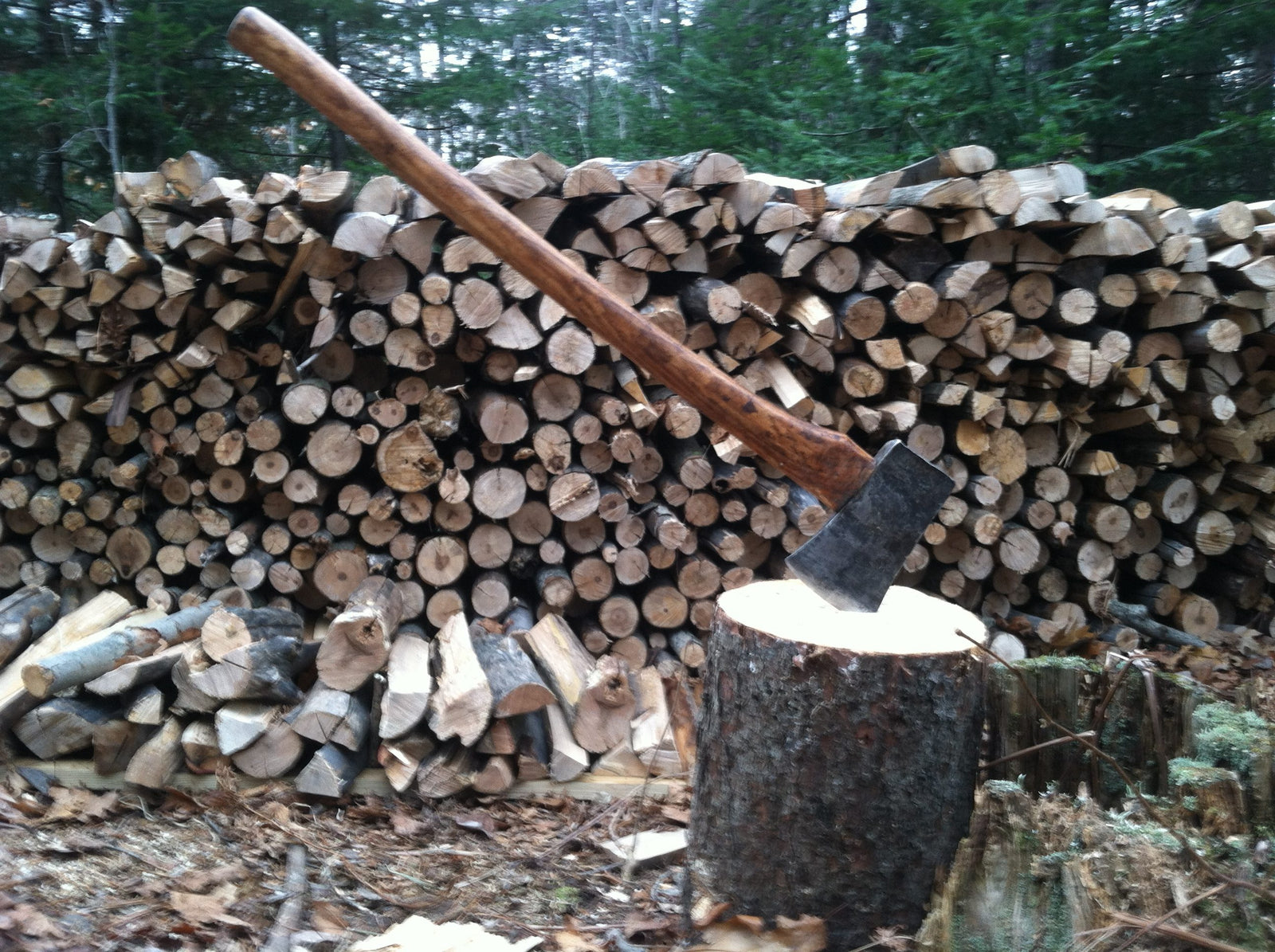For some reason today I woke up in a quantitative frame of mind. I think it is in part due to my daily observations and computing of the overall state of the woodshed, which after being pillaged twice, thrice, or more times daily is starting to look a little gaunt around the haunches like a black bear emerging from it’s winter torpor. We bought five cords of hardwood to add to the cord or so left over from last year with the hopes that 6 cords would be enough to keep our home comfortably warm during the 6 months the stove would be running. While a cord a month seems like a lot, especially for me where I used to burn maybe 2 cords a season keeping my tiny 12’x16’ cabin frost free, I’m starting to think that 8 might be a better goal for next year. I’m not conceding defeat, we will have plenty, it’s just that a few more piles of seasoned hardwood all cozy and dry in the shed would at least take one worry stone out from under my pillow.
Counting and measuring are tools taught to little kiddos as a way to understand and deconstruct our very complex lives down into small, bite sized portions to make for easier digestion. The world is big (a friend used to go to the old Delorme store and ask if the giant globe was 1:1 scale, such a bad joke but it seems like it somehow fits in here) so how about breaking that fairly incomprehensible distance down to something we can readily count and experience like miles or feet?
Nerd time and slight digression:
A mile or a mille passu (a thousand paces) comes from the Romans who measured the length of a pace (two strides) of the average Roman Legionnaire at around 5ish feet. A thousand paces then would come out to roughly 5000 feet per mile, I suppose our European feet must be on average a few inches larger to explain the 280 foot difference. Other measurements we got from the Romans: the Foot, the League and more arcane the width of modern rail road tracks is supposedly attributed to the width of two roman horses rear ends, although this one is up for debate. Bottom line: we count Nature to understand it, to be able to interface with it and to find our place in it.
Fisherman count Nature a lot. John in the book of, well, John said that Simon not only caught some fish, he caught 153, not that anyone was counting. To me this fishing story would have been just as profound without the specific tallying of fish in the net, after all it is a prefect story validating the reason to hire a fishing guide (Jesus said “Throw your net on the right side of the boat and you will find some”). But I guess they were fisherman and even though us fisherman will guilelessly say that it’s all about being out there and not about catching, we deep down know that’s a shameless lie. We count our catch, out flies lost, the water temperature, and even how many other fisherman were on the water with you ( and of course how much better you were faring than they were). On the biblical kick, I can count at least 6 deadly sins we fisherman bend on a regular basis: thou shall not have pride in thy fishing abilities, thou shall not have envy of another man’s fish or fishing gear, thou shall not be angry with an aquatic animal with the brain the size of a pencil eraser, thou shall not be gluttonous of your catch, thou shall not be greedy for a river with no one else fishing it, and don’t be a lazy fisherman. Man, we’re in trouble, better count me out.
Hikers and campers, you’re guilty of living by the numbers too: you know trail head to campsite distances and how long your average mile takes you to walk, vertical feet gained and lost in a day, calories per ounce of food, thermal retention of each ounce of insulation, how to maximize each cubic inch of your backpack, and the weight to strength ratio of ripstop nylon verses cuben fiber.
Climbers: yup. Your whole difficulty scale is a number system and bouldering is often described as a mathematical “problem” to be figured out. Skiiers- you know the proper wax for a given air temperature and snow composition. Canoers. Kayakers. Archers. Hunters. We all can break our outdoor passion down to a numbers game.
I guess in the end the numbers kind of matter…at least to some of us. I was recently talking to a friend at his daughter’s birthday- princess- tea party …and he was sharing his passion for fly fishing but admitted to not caring to know how many tails a blue wing olive has or how to tie specific patterns. I told him that even though I care about the subtle minutia of the sport, I agree with his perspective and that as I guide I usually care more that the person flinging the fly believes in its effectiveness and has the tingles that it will work instead of intellectually knowing why it should work but without the confidence that it’ll put fish in their net. I once saw a friend catch the only fish of the day on a poorly tied black Royal Wulff that looked like it had spent the night at the bar and woke up early to fish (think Neal Burns in a River Runs Through It). There was no intellectual reasoning that could explain why that fly worked, but I guess that’s the difference between the beauty and the brains. Why the numbers matter is that it was dumb luck to me that he caught a fish, not deep skill.
Where do you fall on the number game spectrum? Is it enough just to get out there and enjoy the bliss? Do you resort to less-than-ideal techniques to get the job done and balance the books in your Nature numbers game? Does your hiking stick have notches carved in it for each trip you completed? Would you be just as happy poking around a boulder in a city park instead of completing that 5.12? Do you string up a double nymph dropper rig with split shot and a bobber to hook a trout when dry flies fail you? Either way gets you to the finish line, but then again, I do believe that the deeper you dive into whatever draws you into the Wild, the more you will get in return.
Paul Sveum, a former Maine Sport Outfitters employee, is a Registered Maine Guide, Fly Fishing Guide, Bushcraft & Survival Instructor, and a blogger…among many other things.

